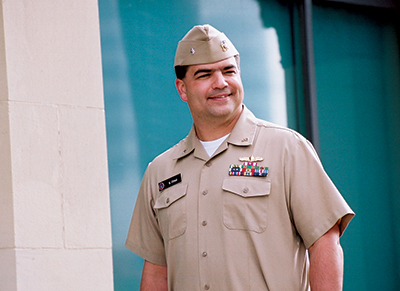Two years after receiving his LL.M. in Trial Advocacy from California Western, Commander Kevin O'Neil's career as a military judge for the Western Judicial Circuit of the Navy's JAG Corps is thriving.

Since his certification last May, O'Neil has heard several San Diego courts-martial, brought pursuant to the Uniform Code of Military Justice and the Rules for Courts-Martial.
O'Neil received his bachelor's degree in mathematics magna cum laude from the University of Massachusetts, Dartmouth, in 1988, and his J.D. from Suffolk University Law School cum laude in 1992.
In August of 2007, O'Neil received the 2007 Outstanding Military Service Career Judge Advocate Award by the American Bar Association.
Res Ipsa: What is your area of concentration?
O'Neil: My LL.M. from California Western is in Trial Advocacy with a specialization in federal criminal law. Within the U.S. Navy JAG Corps, my concentration is military justice/trial advocacy.
Res Ipsa: How and when did you know that you wanted to be a lawyer?
O'Neil: I never had a moment of clarity on this. I loved the television show L.A. Law, and, frankly, that is what got me interested in being a lawyer. By my third year of law school, I was very disenchanted with the way big firms handled the hiring process, so I was ready to finish law school and do something else. I applied for Navy JAG in March 1992, was accepted in early April, commissioned April 30, 1992, and graduated law school that May.
Res Ipsa: After receiving your J.D., what events led you to become a military judge?
O'Neil: I have been on active duty in the Navy JAG Corps since January 1993. The Navy paid for my LL.M., and I "repaid" the Navy by serving as a supervisory defense counsel in San Diego from May 2005 through April 2007. In April 2007, I went to the U.S. Army JAG School in Charlottesville, Va. for a three-week course to become certified as a military judge. I am currently a military judge in San Diego.
Res Ipsa: What do you like the most about enforcing military justice?
O'Neil: I enjoy being the arbiter, the one who is charged with being the most knowledgeable in the room about applicable law, rules, and procedure. Our system of criminal justice, like any other, is only as good as the people charged with its daily operation. Ensuring the rights of service members are protected in the environmental imperative of good order and discipline can at times be a bit challenging - I fully appreciate and comprehend the significance of my position on the military bench, and I love going to work every day.
Res Ipsa: What have you found most fulfilling about your career thus far?
O'Neil: The opportunity to guide and influence the development of young Navy lawyers. My two years as a supervising attorney were the most rewarding, personally and professionally. Working with young attorneys, all with robust workout regimens, kept me energetic and young. It was an opportunity to pass on what I have learned and experienced. Not only the rules, but how they fit into the big picture, especially when the person who decides how a case might plead out is a ship commanding officer. Much of what we did involved being a good Naval officer as well as an attorney. It was the opportunity to train new Navy JAG officers in both.
Res Ipsa: How has your experience at California Western contributed to the success of your career?
O'Neil: Tremendously. Beyond the education, which developed both my academic and advocacy skills, the relationships I’ve developed with the LL.M. faculty and staff continue today. I was able to form the foundation for a developing relationship between the school and the Navy JAG Corps regarding the training of Navy lawyers for litigation-intensive positions.
Res Ipsa: Tell us more about this training opportunity.
O'Neil: The Navy JAG Corps, as part of its ongoing transformation effort to ensure legal services in the Navy adapt to increasingly joint and technological operational settings, has created a specialized community of litigation specialists. As part of the professional growth track for this specialized community, Navy JAG Corps intends to send two officers a year to an LL.M. program in trial advocacy. California Western's LL.M. program is the natural fit, and I am working with Professors Mario Conte and Justin Brooks to ensure the program can make minor adjustments for Navy JAG Corps students. The benefit is that we (Navy JAG) get two highly trained litigators with a focus in federal criminal law each year. Such specialized training is critical to the viability of our specialized community of military justice specialists. The specialized community does not have a name, but an officer can apply for what we call a Military Justice Litigation Qualification as either an Expert or a Specialist. I have the Expert Military Justice Litigation Qualification, or Expert MJLQ as we call it.
Res Ipsa: What would you like to accomplish within the next five years?
O'Neil: I would like to forge a permanent relationship between California Western and the Navy JAG Corps, with the primary goal of fostering a training continuum for litigation specialists in my Navy legal community. On a personal note, my first scholarly paper was well received by the California Western LL.M. faculty and was published in Naval Law Review. I would like to author at least one more published paper on a military law or criminal law rules of evidence topic.
Res Ipsa: Tell us something interesting about yourself.
O'Neil: I am a rabid Red Sox fan (yes, I have had my hats and batting helmets since the early 70s). I also enjoy singing. I am a cantor at my church, and have participated in productions of The Music Man, Camelot, and Gypsy.